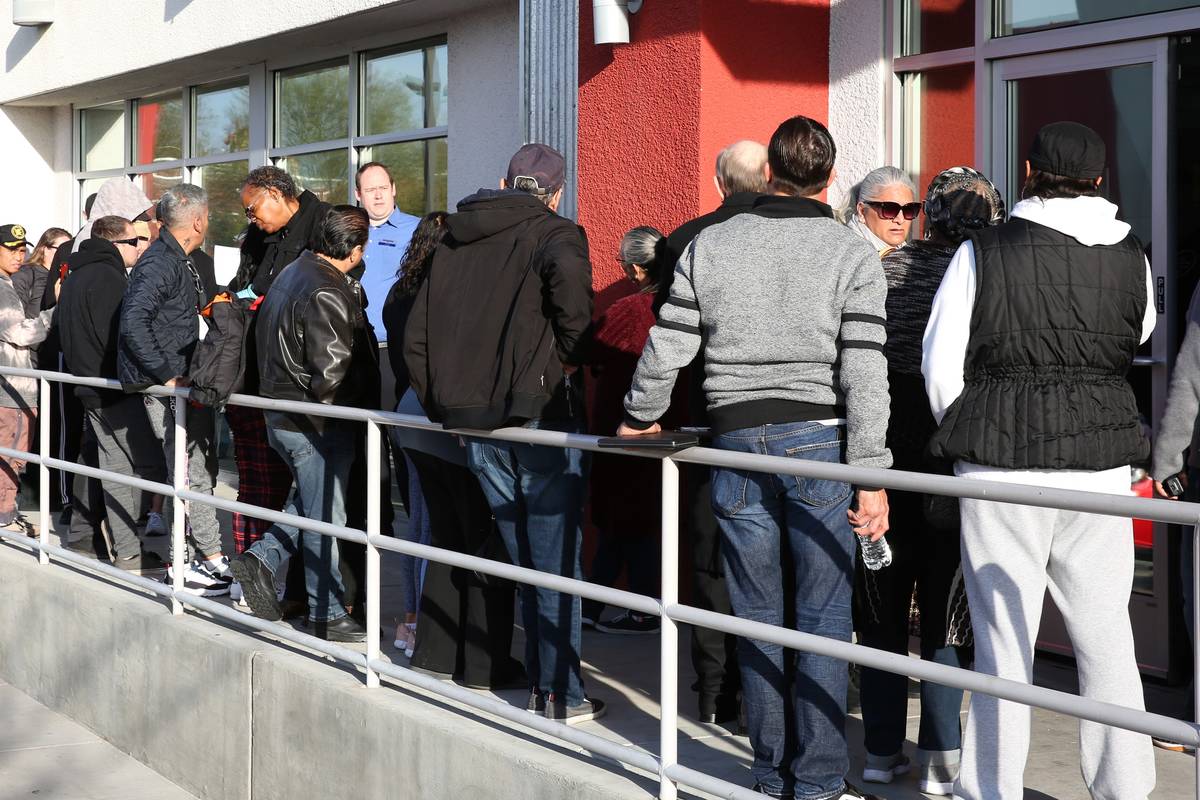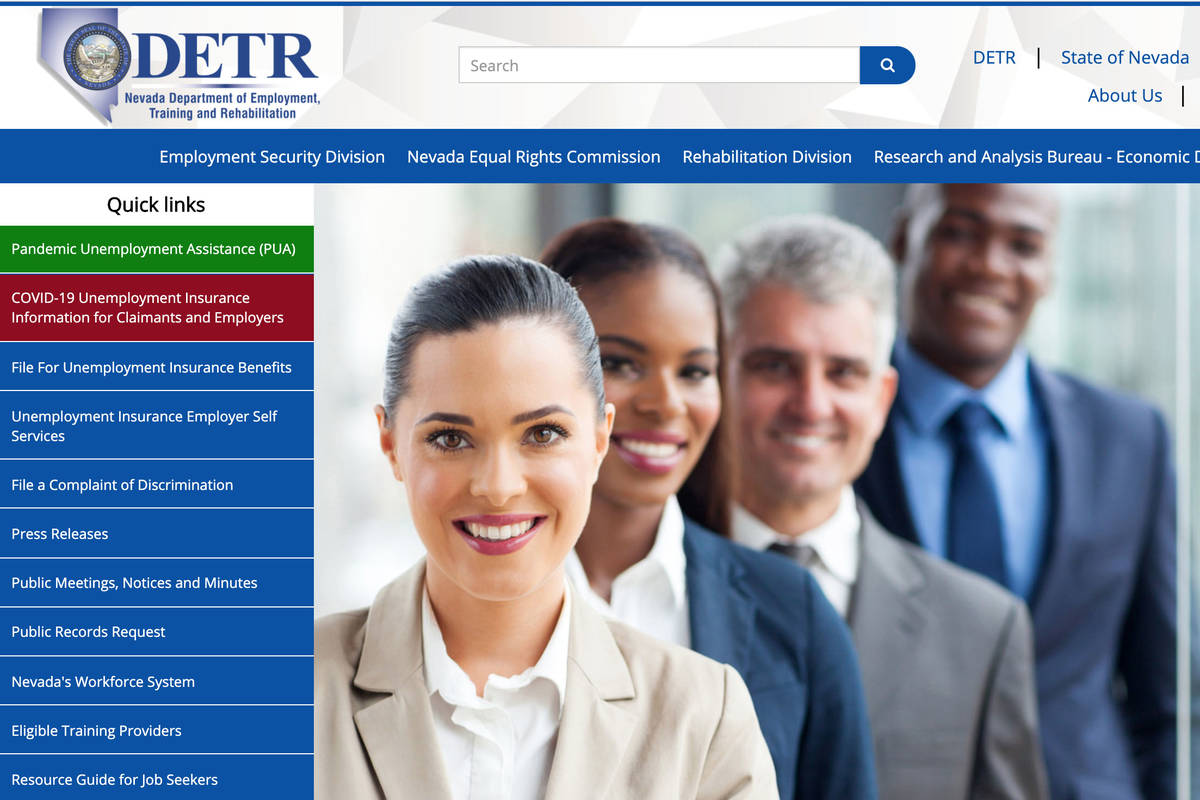Report outlines DETR, call center failings for Nevada jobless
A comprehensive report examining the unemployment benefits system and ways to address payment processing delays for Pandemic Unemployment Assistance claims found multiple “‘bottlenecks’ and fractures” posing problems for the state’s employment agency and benefits claimants.
The 310-page report identified eight primary factors driving delays in payments from the Department of Employment, Training and Rehabilitation and the thousands of contracted and self-employed workers who applied for PUA benefits under the CARES Act. The report was released to media Friday by the plaintiffs in a class-action lawsuit, filed in May, against DETR requesting judicial intervention in the state’s ongoing unemployment crisis.
Second Judicial District Court Judge Barry Breslow appointed a special hearing master, attorney Jason Guinasso, to compile the report in anticipation of a Monday hearing where the judge will decide whether to force DETR to immediately pay all pending PUA claims or otherwise address processing delays. Guinasso, of Hutchison and Steffen Attorneys, worked with DETR officials and the plaintiffs’ law firm, Thierman Buck, to discuss the claims process and pinpoint potential issues that could be addressed through a court order in the form of a writ of mandamus.
Among the issues the report found were “the widespread existence of ‘glitches’ in the benefit delivery system,” an unemployment system unprepared for the massive call volume and swift implementation of new programs, “rampant” claimant errors, systematic fraud and a call center that “has failed to consistently deliver competent and compassionate service.”
DETR spokeswoman Rosa Mendez said the agency does not comment on pending litigation.
Additionally, Guinasso made four significant recommendations to the court on how best to address those issues.
Stuck with Alorica
The third-party call center tasked with handling and adjudicating PUA claims, Alorica, has been a source of ire for many claimants.
Guinasso recommends the state begin a quality control review of 135 Alorica employees and provide additional training. But that’s only if the state is stuck with the call center for the time being.
If Guinasso had his way and the state wasn’t under contract with Alorica through Dec. 31, the state would immediately end its contract “based on the avalanche of complaints that have been received about the customer service and performance of this call center.”
“It is unconscionable that the suffering of people who have lost their jobs due to circumstances beyond their control should be subjected to the cruelty of a call center that does not appear to be providing competent and compassionate service,” Guinasso wrote in his report.
Appeals system and ‘receiver’
The report found that claimants didn’t have a method of appeal if they took issue with a claims decision made by DETR or its Employment Security Division.
It indicates an appeal module would go live Saturday morning via EmployNV, and “Claimants will have 30 days from the date the Appeals module goes live to file their appeals.”
However, the report also recommended the appointment of a “receiver,” who “would be directed to ensure that the appeal process established by ESD is fully implemented and is providing aggrieved claimants due process.”
Volunteer network to address backlog
DETR concedes in the report it wasn’t prepared to handle the significant volume of benefits claims in a short span while juggling the implementation of new benefits programs under the CARES Act.
The report suggests forming a team of temporary volunteers — “consisting of 1,000 competent volunteers (who) could be deployed within several days of a Court order” — to help address the backlog and sort out legitimate and bogus claims. It set a goal of eradicating the backlog in 45 days.
The team of volunteers could come from labor unions, nonprofit groups, civic organizations, faith-based organizations and supplemented by the National Guard, the report said.
“There is a large reservoir of compassionate and talented people in Nevada ready and willing to help their neighbors through this difficult time of economic uncertainty and hardship if given the opportunity and properly equipped with the training and authority to serve,” the report said.
Fraud trap
Guinasso recommends a hearing for claims suspected of fraud to set a sort of “trap” to weed out those claims.
A hearing and “hearing referee” could help address issues with legitimate claims while scaring off defrauders from continued illicit filing, the report said.
If the fraud problem is as rampant as state officials say it is, Guinasso wrote, claims with multiple red flags or issues that can’t be quickly addressed should be immediately denied.
“But, if they do (show up to the hearing), the hearing process will serve as an effective trap to help law enforcement capture thieves who are compounding the suffering of Nevada’s displaced and beleaguered workforce,” he wrote.
Contact Mike Shoro at mshoro@reviewjournal.com or 702-387-5290. Follow @mike_shoro on Twitter.



















